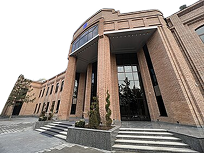

- About NewUU
- Research
- Admissions
- Student life
- News & Events
- Contact us
- About NewUU
- Research
- Admissions
- Student life
- News & Events
- Contact us
M.Sc. in Artificial Intelligence and Machine Learning
M.Sc. in Artificial Intelligence and Machine Learning
The M.Sc. program in Artificial Intelligence and Machine Learning at New Uzbekistan University is an intensive one-year program designed to provide students with a strong theoretical foundation and practical expertise in AI-driven technologies. The program offers a rigorous curriculum covering algorithmic principles, artificial intelligence methodologies, and advanced machine learning techniques, equipping graduates with the skills required for both industry and research.
Students will complete five graduate-level courses: Algorithm Design Techniques, Artificial Intelligence, Machine Learning, Deep Learning, and Theoretical Foundations of Machine Learning. These courses provide a comprehensive understanding of the theoretical and applied aspects of AI and ML, ensuring that students gain both depth and breadth in the field. Alongside their coursework, students will undertake a Master Project, where they will apply their knowledge to solve real-world AI challenges. Additionally, a research seminar course will help them develop critical analysis, research, and presentation skills, preparing them for academic and professional excellence.
This accelerated program is ideal for professionals seeking to advance their expertise in AI and ML, as well as for graduates aspiring to pursue research in artificial intelligence. By integrating fundamental concepts with cutting-edge developments, the program prepares students for leadership roles in AI-driven industries, research institutions, and technological innovation.

Program Structure
The M.Sc. in Artificial Intelligence and Machine Learning is a one-year program consisting of two semesters and a total of 60 ECTS credits. Classes are expected to be held four times a week in the evening. Please note that the schedule is subject to change. A suggested curriculum is as follows:
| First Year | ||||
|---|---|---|---|---|
| Semester | Course Code | Course | Course Type | ECTS Credits |
| Semester 1 | CS610 | Algorithm Design Techniques | Core | 8 |
| CS620 | Artificial Intelligence | Core | 8 | |
| CS630 | Machine Learning | Core | 8 | |
| AIMLXXX | Graduate CS Elective Course | Elective | 8 | |
| Semester 2 | CS631 | Deep Learning | Core | 8 |
| CS632 | Mathematical Foundations of Machine Learning | Core | 8 | |
| AIML790 | Master Project | Core | 15 | |
| Total Credits | 63 | |||
| Program's Total Credits | |||
| Elective Course Options | ||
|---|---|---|
| Course Code | Course | ECTS Credits |
| AIMLXXX | Graduate CS Elective Course | 8 ECTS |
Entry requirements
- Bachelor degree from an accredited institution (minimum 180 ECTS credits) or a higher academic qualification (degree course format should be full-time or part-time)
English language requirements
Proficiency in the English language as evidenced by one of the below:
- IELTS 6.0 or higher
- TOEFL iBT 60 or higher
Note: We accept only the TOEFL iBT taken at approved test centers. We do not accept the TOEFL iBT Home Edition.
- CEFR B2 (56-60)
Applicants who have completed their bachelor’s degree entirely in English do not need to provide any additional proof of language proficiency.
Deadline for Registration
5th September, 2025
Fees and Funding
| Tuition Fee for 2025/2026 Academic Year | |
|---|---|
| Local students | 55 000 000 UZS per academic year |
| International students | $ 6 500 USD per academic year |
Career Perspectives
Graduates of the M.Sc. in Artificial Intelligence and Machine Learning program will be well-prepared for careers in AI-driven industries, research institutions, and innovative startups. With expertise in machine learning, deep learning, and AI methodologies, they will be equipped to develop intelligent systems, analyze complex datasets, and advance cutting-edge AI research. Their strong theoretical foundation and hands-on experience will enable them to take on key roles in both industry and academia. Here are some potential career paths and opportunities:
Potential career paths include:
- 1. AI Engineer: Designs and implements AI-powered applications, develops machine learning models, and integrates intelligent systems into real-world products and services.
- 2. Machine Learning Scientist: Conducts research on advanced machine learning algorithms, improves predictive models, and develops innovative AI techniques for various domains.
- 3. Data Scientist: Leverages AI and machine learning to analyze large datasets, extract insights, and build data-driven solutions in industries such as healthcare, finance, and e-commerce.
- 4. Deep Learning Engineer: Specializes in neural networks and deep learning models, working on applications such as computer vision, natural language processing, and autonomous systems.
- 5. AI Researcher: Advances the field of artificial intelligence by developing novel algorithms and contributing to academic and industrial research in AI and ML.
The program provides graduates with the knowledge and skills necessary to excel in the rapidly evolving AI landscape, preparing them for leadership roles in AI development, research, and innovation.
Skills and Attributes
Graduates of the M.Sc. in Artificial Intelligence and Machine Learning will develop expertise in designing and implementing AI models, analyzing complex datasets, and applying machine learning techniques to real-world problems. They will also enhance their critical thinking, research abilities, and problem-solving skills, enabling them to drive innovation in AI-driven industries. Additionally, they will strengthen their collaboration, communication, and project management skills, preparing them for leadership roles in both industry and academia.
 O'zbekcha
O'zbekcha
 Русский
Русский
 English
English
